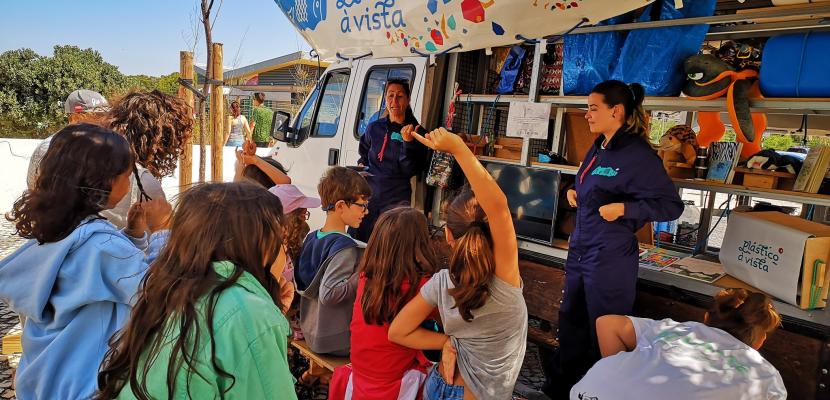
Plastic In Sight

About this good practice
Aiming to expose the impact of marine litter to people from all walks of life, we created Plastic In Sight. In order to reach everyone, we made it mobile, with the PAVan, a plastic waste recycling station in a van. Using DIY methods, the participants have a hands-on experience with the recycling process, intertwined in a larger programme, based on the 2030 SDG's. Beneficiaries are exposed to the connection of plastic use in their daily lives and ocean pollution. Activities range from the exhibition of films and documentaries, to local and tradicional games, to waste recovery from local beaches, to the use of the recycling machines, or all of these, depending on the group.
The PAVan has a mobile classroom that can be assembled just about anywhere, and seats 25. It is set up with audio and video equipment, and the Precious Plastic machines.
The pilot ran by the shore side, on the communities of Trafaria and Costa da Caparica, in Almada Municipality, on the south shore of the Tagus river, opposite Lisbon, in Portugal. We worked with schools an daycares, social support institutions, libraries, homeowners associations and fishing professionals associations. While most sessions were held in partners facilities, there were "open" sessions, on beaches and public parks, promoting awareness on the environmental cost of using plastics and presenting better practices for reducing that cost, for a more responsible consumption and production.
Expert opinion
Resources needed
The pilot project was funded by the European consortium, NO PLANET B - AMI (€68K) and the support of APLM, FCT, IPL, CMA. A team of producers, designers, architects and marine scientists, along with local volunteers, in several workshops, created the PAVan itself and all the play-to-learn materials.
Evidence of success
Plastic in sight had funding for 900 beneficiaries, in 13 sessions, in 7 routes. In the end, there were more than 30 routes, about 240 sessions and more than 4.000 beneficiaries.
Two good examples of how Plastic In Sight achieved its goals are: inspired an eco-enterprise of biodegradable bags; "promoting environmental protection" became the main theme for the annual activities program in the two school councils (and the local library) that had hosted us, in the following year.
Potential for learning or transfer
The need for an increased awareness on plastic as marine litter exists worldwide. The practices followed in Plastic In Sight can be replicated in most places: the contents (eg. 2030 SDG's or PlasticOcean videos) are made available by several organizations; almost any van can become a PAVan; and the Precious Plastics machines are open source technology.
The challenge is finding an implementing partner connected with the local stakeholders: academic; political; educational; social institutions and professional; that can help in assuring (respectively): that the programming contents are accurate, up-to-date, and adapted to local characteristics; align with local policy; can be seamlessly integrated in school curricula and, most important; help find the local issues, in and around plastic as marine litter, that the programming may be built around, expose or respond to.
Plastic In Sight has migrated to the north shore of the Tagus, to Lisbon, where zerop.org is implementing it.
Further information
Good practice owner
You can contact the good practice owner below for more detailed information.
